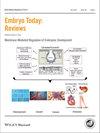下载PDF
{"title":"Challenges in the diagnosis and management of disorders of sex development","authors":"Katherine Kutney, Laura Konczal, Beth Kaminski, Naveen Uli","doi":"10.1002/bdrc.21147","DOIUrl":null,"url":null,"abstract":"<p>Disorders of sex development (DSD) represent a spectrum of uncommon but very complex disorders with medical, psychosexual, and family implications for those affected by them. The diagnosis and management of these disorders requires a coordinated team of multiple specialists. Following an international conference in Chicago in 2005, a consensus statement was created and presented, which has resulted in a new paradigm in the nomenclature, classification, and management of DSDs. Since that time, many improvements have been forthcoming, most notably in the area of molecular genetic technologies. These developments have advanced our understanding of the specific etiologies underlying many of these conditions. In this article, we present an overview of the physiology of sex development, a few clinical vignettes highlighting specific pathologic conditions, discussions regarding the evaluation and management of these disorders, and some thoughts on future directions in this field. Birth Defects Research (Part C) 108:293–308, 2016. © 2016 Wiley Periodicals, Inc.</p>","PeriodicalId":55352,"journal":{"name":"Birth Defects Research Part C-Embryo Today-Reviews","volume":"108 4","pages":"293-308"},"PeriodicalIF":0.0000,"publicationDate":"2016-12-29","publicationTypes":"Journal Article","fieldsOfStudy":null,"isOpenAccess":false,"openAccessPdf":"https://sci-hub-pdf.com/10.1002/bdrc.21147","citationCount":"14","resultStr":null,"platform":"Semanticscholar","paperid":null,"PeriodicalName":"Birth Defects Research Part C-Embryo Today-Reviews","FirstCategoryId":"1085","ListUrlMain":"https://onlinelibrary.wiley.com/doi/10.1002/bdrc.21147","RegionNum":0,"RegionCategory":null,"ArticlePicture":[],"TitleCN":null,"AbstractTextCN":null,"PMCID":null,"EPubDate":"","PubModel":"","JCR":"Q","JCRName":"Medicine","Score":null,"Total":0}
引用次数: 14
引用
批量引用
Abstract
Disorders of sex development (DSD) represent a spectrum of uncommon but very complex disorders with medical, psychosexual, and family implications for those affected by them. The diagnosis and management of these disorders requires a coordinated team of multiple specialists. Following an international conference in Chicago in 2005, a consensus statement was created and presented, which has resulted in a new paradigm in the nomenclature, classification, and management of DSDs. Since that time, many improvements have been forthcoming, most notably in the area of molecular genetic technologies. These developments have advanced our understanding of the specific etiologies underlying many of these conditions. In this article, we present an overview of the physiology of sex development, a few clinical vignettes highlighting specific pathologic conditions, discussions regarding the evaluation and management of these disorders, and some thoughts on future directions in this field. Birth Defects Research (Part C) 108:293–308, 2016. © 2016 Wiley Periodicals, Inc.
在性发育障碍的诊断和管理的挑战
性发育障碍(DSD)代表了一系列罕见但非常复杂的疾病,对受其影响的人具有医学、性心理和家庭影响。这些疾病的诊断和管理需要一个由多名专家组成的协调团队。2005年在芝加哥举行的一次国际会议之后,建立并提出了一项共识声明,这导致了dsd的命名、分类和管理的新范式。从那时起,许多改进已经到来,最显著的是在分子遗传技术领域。这些进展提高了我们对许多这些疾病的具体病因的理解。在这篇文章中,我们概述了性发育的生理学,一些临床小片段,突出了具体的病理条件,关于这些疾病的评估和管理的讨论,以及对该领域未来发展方向的一些思考。出生缺陷研究(C辑)(8):393 - 398,2016。©2016 Wiley期刊公司
本文章由计算机程序翻译,如有差异,请以英文原文为准。

 求助内容:
求助内容: 应助结果提醒方式:
应助结果提醒方式:


